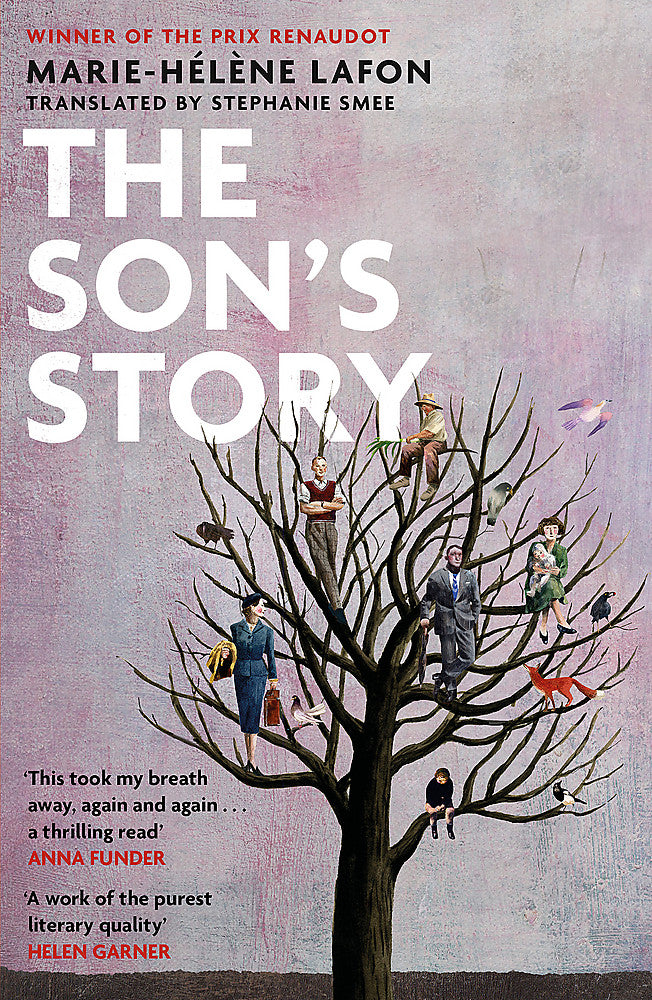Marie-Helene Lafone
The Son's Story
The Son's Story
Couldn't load pickup availability
Susan Midalia's Review
It’s not hard to understand why this new novel from acclaimed French writer Marie-Hélène Lafon is both a bestseller and the winner of a prestigious literary prize. Its popularity no doubt lies in its appeal to our desire for connection and a sense of belonging, and in its use of a plot centred on forbidden love and the revelation of a family secret. It’s also a worthy winner of France’s Prix Renaudot: as an example of literary fiction, The Son’s Story is exquisitely written, intricately structured and in its exploration of family responsibilities and legacies, youthful sexual desire and ageing, achingly unresolved.
The novel focuses on the lives of the Lachalme family over the course of a century. Set mainly in regional France, with excursions to Paris, the story begins with five-year-old Armand in 1908 and concludes with his great-nephew Antoine in 2008. What happens in the opening sequence will recur as a both a lived experience for the child’s family and as a metaphor for the burden of the past over generations. But The Son’s Story is no conventional family saga: moving backwards and forwards in time, its use of multiple perspectives reminds us that there is no simple cause-and-effect pattern to life; no single ‘truth’ about reality. One striking example is the character of Gabrielle, the mother who, consistently refusing to disclose the identity of the father of her child, chooses to leave her young son in the care of her sister Helene. While the ‘surface’ Gabrielle appears indifferent to her son, preferring to lead an independent life in Paris, a belated glimpse of her circumstances as an ageing woman, seen through the eyes of distant family members, complicates our response to a seemingly unlikeable character.
Perhaps the novel’s central question is raised by its title: who is the ‘son’ whose story we are attending to? Gabrielle’s son Andre is one possibility; but as the child Andre himself points out, he has always had two words for his mothers: maman for his aunt Helene, who raised him, and the more formal ma mere for his biological mother. But the novel’s affirmation of the aunt as a loving substitute mother is complicated by her and her husband’s desire for a son: after having three daughters, they are only too willing to welcome a boy into the family fold. Is this son’s story, then, a typical privileging of masculinity? Or is the ‘son’ of the title the five-year-old child Armand, whose fate becomes entangled with that of his family and his beloved servant? There is also a literally absent son, Paul, whose childlessness represents both his estrangement from the family and his deeply repressed guilt as Armand’s brother. In all this, the novel doesn’t tell us what to think; instead, it works through suggestion, reminding us of that the gaps and silences that make up every life are as important as what is articulated.
The Son’s Story is also enriched by a sense of history, both global and personal. Against the backdrop of two world wars, the Vichy regime’s collaboration with the Nazis and the changing social mores of the twentieth century, it gives us the dailyness of marital rituals and conversations; the shared losses and mutual support, the arrival of children and grandchildren. It’s an immersive, engaging read that I for one will return to, to savour the beauty of the prose, and to reflect on the complexities of its characters.
Seamlessly translated by Stephanie Smee, The Son’s Story is now available in the Lane Bookshop.
Publisher's Review
WINNER OF THE PRIX RENAUDOT.
'This took my breath away, again and again. Lafon is magic ... A thrilling read in Stephanie Smee's masterful translation' - Anna Funder, Sunday Times bestselling author of Wifedom
'A work of the purest literary quality: muscular and densely packed, yet graceful in all its movements, and glowing with brilliant detail' - Helen Garner, author of This House of Grief
This is the story of a family and the secret that lies at its heart. Andre is the son, raised by his aunt in the French countryside. His mother Gabrielle, beautiful but distant, lives in Paris. Surrounded by his cousins, far from the noise of the city, Andre's childhood is a happy one. No-one questions the absence of his mother, or dares voice the name of his father.
But beneath the quiet joy of the everyday lies a tragedy, passed down through the generations. Over time, the truth will come to the surface, whether the son desires it or not.
'A magnificent novel' - La Croix
'[Lafon] breathes life into language . . . pure and rich' - Le Monde
'Captivating and heartbreaking from beginning to end' - Le Figaro Magazine
Share


